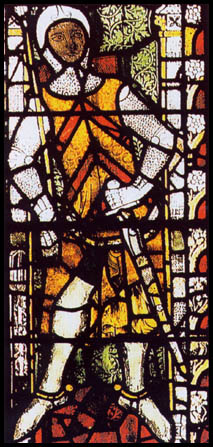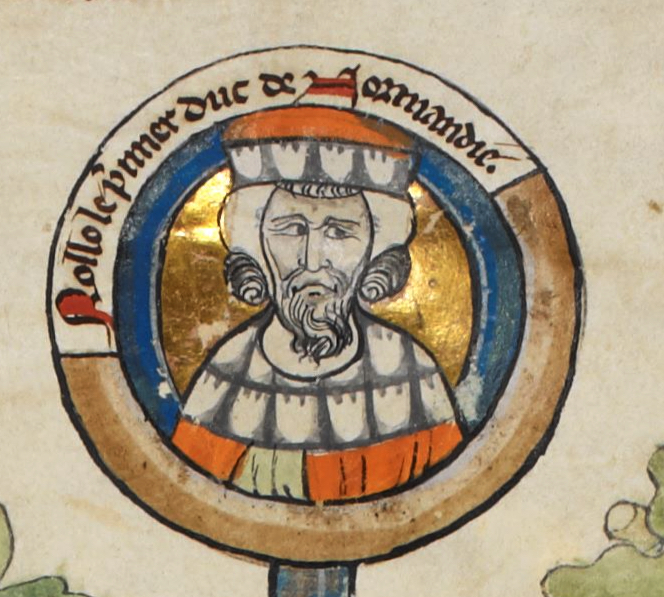|
De Clare Family
The House of Clare was a prominent Anglo-Normans, Anglo-Norman noble house that ruled the Earldoms of Pembroke, Hertford and Gloucester in England and Wales throughout its history, playing a prominent role in the Norman invasion of Ireland. They were descended from Richard fitz Gilbert, Richard Fitz Gilbert, Lord of Clare (1035–1090), a kinsman of William the Conqueror who accompanied him into England during the Norman conquest of England. His great-grandfather was Richard I of Normandy who was the son of William Longsword and the grandson of the Viking Rollo. As a reward for his service, Richard was given lands in Suffolk centred on the village of Clare, Suffolk, Clare. As a result, Richard and his descendants carried the name of 'de Clare' or 'of Clare'. The de Clares ranked among the greatest baronial houses of the early Middle Ages and were the proprietors of the monumental Caerphilly Castle, Pembroke Castle, Castell Coch, and over 190 manors in England. Origins The Cl ... [...More Info...] [...Related Items...] OR: [Wikipedia] [Google] [Baidu] |
House Of Normandy
The House of Normandy ( ) was a noble family originating from the Duchy of Normandy. The House of Normandy's lineage began with the Scandinavian Rollo who founded the Duchy of Normandy in 911. The House of Normandy includes members who were dukes of Normandy, counts of Rouen, as well as kings of England following the Norman conquest of England. It lasted until Stephen of the French House of Blois seized the Duchy of Normandy in 1135. The house emerged from the union between the Viking Rollo (first ruler of Normandy) and Poppa of Bayeux, a West Frankish noblewoman. William the Conqueror and his heirs down through 1135 were members of this dynasty. After that it was disputed between William's grandchildren, Matilda, whose husband Geoffrey was the founder of the House of Plantagenet, and Stephen of the House of Blois (or Blesevin dynasty). The Norman counts of Rouen were: * Rollo, 911–927 * William Longsword, 927–942 The Norman dukes of Normandy were: * Richard I ... [...More Info...] [...Related Items...] OR: [Wikipedia] [Google] [Baidu] |
Rollo
Rollo (, ''Rolloun''; ; ; – 933), also known with his epithet, Rollo "the Walker", was a Viking who, as Count of Rouen, became the first ruler of Normandy, a region in today's northern France. He was prominent among the Vikings who Siege of Paris (885–886), besieged Paris in 885–886, and he emerged as a war leader among the Norsemen who had secured a permanent foothold on Franks, Frankish soil in the valley of the lower Seine after the Siege of Chartres (911), Siege of Chartres in 911. Charles the Simple, king of West Francia, agreed to the Treaty of Saint-Clair-sur-Epte, which granted Rollo lands between the river Epte and the sea in exchange for Rollo agreeing to end his brigandage, Homage (feudal), swear allegiance to Charles, Conversion to Christianity, convert to Christianity, and pledge to defend the Seine estuary from other Viking raiders. Rollo's life was recorded by Dudo of Saint-Quentin, Dudo of St. Quentin. Historians such as W. Vogel, Alexander Bugge, and He ... [...More Info...] [...Related Items...] OR: [Wikipedia] [Google] [Baidu] |
Tonbridge
Tonbridge ( ) (historic spelling ''Tunbridge'') is a market town in Kent, England, on the River Medway, north of Royal Tunbridge Wells, south west of Maidstone and south east of London. In the administrative borough of Tonbridge and Malling, it had an estimated population of 41,293 in 2019. History The town was recorded in Domesday Book 1086 as ''Tonebrige'', which may indicate a bridge belonging to the estate or manor (from the Old English tun), or alternatively a bridge belonging to Tunna, a common Anglo-Saxons, Anglo-Saxon man's name. Another theory suggests that the name is a contraction of "town of bridges", due to the large number of streams the High Street originally crossed. Until 1870, the town's name was spelt ''Tunbridge'', as shown on old maps including the 1871 Ordnance Survey map and contemporary issues of the George Bradshaw, Bradshaw railway guide. In 1870, this was changed to ''Tonbridge'' by the General Post Office, GPO due to confusion with nearby Tunb ... [...More Info...] [...Related Items...] OR: [Wikipedia] [Google] [Baidu] |
Baldwin V, Count Of Flanders
Baldwin V ( 1012 – 1 September 1067) was Count of Flanders from 1035 until his death. He secured the personal union between the counties of Flanders and Hainaut and maintained close links to the Anglo-Saxon monarchy, which was overthrown by his son-in-law, William the Conqueror, near the end of his life. Family Baldwin was born into the House of Flanders, the son of Baldwin IV of Flanders and Ogive of Luxembourg. Baldwin married Adela, daughter of King Robert II of France, in 1028 in Amiens; at her instigation he rebelled against his father but in 1030 peace was sworn and the old count continued to rule until his death. The couple had three children: Baldwin VI (1030–1070), Matilda ( 1031–1083), who was married to William the Conqueror, and Robert I ( 1033–1093). Career During a long war (1046–1056) as an ally of Duke Godfrey III of Lower Lorraine against Emperor Henry III, Baldwin initially lost Valenciennes to Count Herman of Mons. However, when the l ... [...More Info...] [...Related Items...] OR: [Wikipedia] [Google] [Baidu] |
Baldwin FitzGilbert
Baldwin FitzGilbert ( 1030 – 1086/1091) (''alias'' Baldwin the Sheriff, Baldwin of Exeter, Baldwin de Meulles/Moels and Baldwin du Sap) was a Norman magnate and one of the 52 Devon Domesday Book tenants-in-chief of King William the Conqueror, of whom he held the largest fiefdom in Devon, comprising 176 holdings or manors. He was feudal baron of Okehampton, seated at Okehampton Castle in Devon. Origins He was originally from Meulles or nearby Le Sap, in Calvados, Normandy. He was a younger son of Gilbert, Count of Brionne and of Eu, in Normandy. Career Together with his eldest brother Richard FitzGilbert, in 1066 Baldwin participated in the Norman Conquest of England. Following the successful siege of the Saxon city of Exeter, William the Conqueror appointed Baldwin castellan of the newly built royal castle there, Rougemont Castle. He also appointed him hereditary Sheriff of Devon, a position he held until his death. Exeter Castle was thenceforth the official seat o ... [...More Info...] [...Related Items...] OR: [Wikipedia] [Google] [Baidu] |
Duke Of Normandy
In the Middle Ages, the duke of Normandy was the ruler of the Duchy of Normandy in north-western France. The duchy arose out of a grant of land to the Viking leader Rollo by the French king Charles the Simple in 911. In 924 and again in 933, Normandy was expanded by royal grant. Rollo's male-line descendants continued to rule it until 1135, and cognatic descendants ruled it until 1204. In 1202 the French king Philip II declared Normandy a forfeited fief and by 1204 his army had conquered it. It remained a French royal province thereafter, still called the Duchy of Normandy, but only occasionally granted to a duke of the royal house as an appanage. Despite both the 13th century loss of mainland Normandy, the renunciation of the title by Henry III of England in the Treaty of Paris (1259), and the extinction of the duchy itself in modern-day France, the monarch of the United Kingdom is regardless still often informally referred to by the title "Duke of Normandy." This is the ... [...More Info...] [...Related Items...] OR: [Wikipedia] [Google] [Baidu] |
William II Of Normandy
William the Conqueror (Bates ''William the Conqueror'' p. 33– 9 September 1087), sometimes called William the Bastard, was the first Norman king of England (as William I), reigning from 1066 until his death. A descendant of Rollo, he was Duke of Normandy (as William II) from 1035 onward. By 1060, following a long struggle, his hold on Normandy was secure. In 1066, following the death of Edward the Confessor, William invaded England, leading a Franco-Norman army to victory over the Anglo-Saxon forces of Harold Godwinson at the Battle of Hastings, and suppressed subsequent English revolts in what has become known as the Norman Conquest. The rest of his life was marked by struggles to consolidate his hold over England and his continental lands, and by difficulties with his eldest son, Robert Curthose. William was the son of the unmarried Duke Robert I of Normandy and his mistress Herleva. His illegitimate status and youth caused some difficulties for him after he succeeded ... [...More Info...] [...Related Items...] OR: [Wikipedia] [Google] [Baidu] |
Richard I, Duke Of Normandy
Richard I (28 August 932 – 20 November 996), also known as Richard the Fearless (French: ''Richard Sans-Peur''; Old Norse: ''Jarl Rikard''), was the count of Rouen from 942 to 996.Detlev Schwennicke, ''Europäische Stammtafeln, Europäische Stammtafeln: Stammtafeln zur Geschichte der Europäischen Staaten'', Neue Folge, Band II (Marburg, Germany: J. A. Stargardt, 1984), Tafel 79 Dudo of Saint-Quentin, whom Richard commissioned to write the "''De moribus et actis primorum Normanniae ducum''" (Latin, "''On the Customs and Deeds of the First Dukes of Normandy''"), called him a ''dux''. However, this use of the word may have been in the context of Richard's renowned leadership in war, and not as a reference to a title of nobility. Richard either introduced feudalism into Normandy or he greatly expanded it. By the end of his reign, the most important Normans, Norman landholders held their lands in feudal tenure. Birth Richard was born to William Longsword, ''princeps'' (chieftain o ... [...More Info...] [...Related Items...] OR: [Wikipedia] [Google] [Baidu] |
Geoffrey, Count Of Eu
Geoffrey of Brionne (mid-10th century – c. 1010), also called Godfrey was Count of Eu and BrionneWhile there is little doubt Geoffrey (Godfrey) was Count of Eu, there is an open question as to whether Geoffrey was ever "Count" of Brionne. See: Douglas, Earliest Norman Counts, ''EHS'' 61, No. 240 (1946), p.134. in the late tenth and early eleventh centuries. Life He was a son of Duke Richard I of Normandy, by an unnamed wife or concubine.Edmund Chester Waters, The Counts of Eu, Sometime Lords of the Honour of Tickhill, ''The Yorkshire Archaeological and Topographical Journal'', No. 9 (1886), p. 262 The county of Eu was an appanage created for Geoffrey by his half-brother Richard II of Normandy in 996 as part of Richard's policy of granting honors and titles for cadet members of his family. The citadel of Eu played a critical part of the defense of Normandy;Edmund Chester Waters, The Counts of Eu, Sometime Lords of the Honour of Tickhill, ''The Yorkshire Archaeological and Topo ... [...More Info...] [...Related Items...] OR: [Wikipedia] [Google] [Baidu] |
Gilbert, Count Of Brionne
Gilbert (or Giselbert) de Brionne, Count of Eu and of Brionne ( – ), was an influential nobleman in the Duchy of Normandy in Northern France.Deck, S. (1954). Le comté d'Eu sous les ducs. In Annales de Normandie (Vol. 4, No. 2, pp. 99-116). Université de Caen. He was one of the early guardians of Duke William II in his minority, and a first cousin to William's father Duke Robert. Life Gilbert de Brionne was son of Geoffrey, Count of Eu (otherwise cited as 'Godfrey'), who was an illegitimate child of Richard I of Normandy.George Edward Cokayne, ''The Complete Peerage of England Scotland Ireland Great Britain and the United Kingdom, Extant Extinct or Dormant'', ed. Vicary Gibbs, Vol. IV (London: The St. Catherine Press, Ltd., 1916), p. 308 He inherited Brionne, becoming one of the most powerful landowners in Normandy. Gilbert was a generous benefactor to Bec Abbey founded by his former knight Herluin in 1031. When Robert I died in 1035, his illegitimate son William i ... [...More Info...] [...Related Items...] OR: [Wikipedia] [Google] [Baidu] |
Gilbert De Clare Tewkesbury Abbey
Gilbert may refer to: People and fictional characters *Gilbert (given name), including a list of people and fictional characters *Gilbert (surname), including a list of people Places Australia * Gilbert River (Queensland) * Gilbert River (South Australia) Kiribati * Gilbert Islands, a chain of atolls and islands in the Pacific Ocean United States * Gilbert, Arizona, a town * Gilbert, Arkansas, a town * Gilbert, Florida, the airport of Winterhaven * Gilbert, Iowa, a city * Gilbert, Louisiana, a village * Gilbert, Michigan, and unincorporated community * Gilbert, Minnesota, a city * Gilbert, Nevada, ghost town * Gilbert, Ohio, an unincorporated community * Gilbert, Pennsylvania, an unincorporated community * Gilbert, South Carolina, a town * Gilbert, West Virginia, a town * Gilbert, Wisconsin, an unincorporated community * Mount Gilbert (other), various mountains * Gilbert River (Oregon) Outer space * Gilbert (lunar crater) * Gilbert (Martian crater) Arts and ent ... [...More Info...] [...Related Items...] OR: [Wikipedia] [Google] [Baidu] |
Castell Coch
; ) is a 19th-century Gothic Revival castle built above the village of Tongwynlais in Wales. The first castle on the site was built by the Normans after 1081 to protect the newly conquered town of Cardiff and control the route along the River Taff. Abandoned shortly afterwards, the castle's earth motte was reused by Gilbert de Clare as the basis for a new stone fortification, which he built between 1267 and 1277 to control his freshly annexed Welsh lands. This castle may have been destroyed in the native Welsh rebellion of 1314. In 1760, the castle ruins were acquired by John Stuart, 3rd Earl of Bute, as part of a marriage settlement that brought the family vast estates in South Wales. John Crichton-Stuart, 3rd Marquess of Bute, inherited the castle in 1848. One of Britain's wealthiest men, with interests in architecture and antiquarian studies, he employed the architect William Burges to rebuild the castle, "as a country residence for occasional occupation in the summer", ... [...More Info...] [...Related Items...] OR: [Wikipedia] [Google] [Baidu] |




